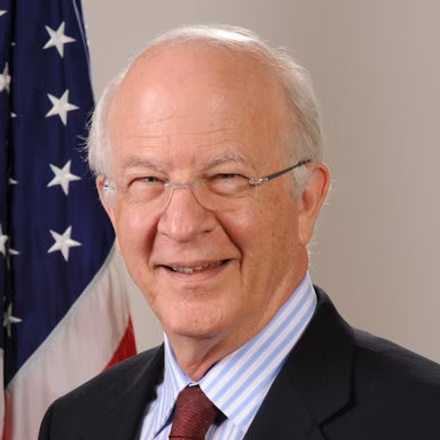Ambassador Chester Crocker – Vice President

Ambassador Chester Crocker is the James R. Schlesinger professor of strategic studies at Georgetown University’s Walsh School of Foreign Service and serves on the board of its Institute for the Study of Diplomacy. Ambassador Crocker’s teaching and research focus on international security and conflict management. From 1981 to 1989, Ambassador Crocker served as assistant secretary of state for African affairs. He developed the strategy and led the diplomacy that produced the treaties signed by Angola, Cuba, and South Africa in New York in December 1988. These agreements resulted inNamibia’s independence (March 1990) and the withdrawal of foreign forces from Namibia and Angola. President Ronald Reagan granted him the Presidential Citizens Medal, the country’s second-highest civilian award. Previous government experience included service on Henry A. Kissinger’s National Security Council staff (1970– 1972) where he worked on Middle East, Indian Ocean, and African issues.
Ambassador Crocker chaired the board of the United States Institute of Peace (1992–2004) and continued to serve as a director through 2011 of this independent, nonpartisan institution created and funded by Congress to strengthen knowledge and practice in international conflict. He serves on the boards of Universal Corporation, Inc., a leading independent trading company in tobacco and agricultural products and the Good Governance Group Ltd, an independent strategic advisory firm. He is a founding member of the Global Leadership Foundation, an international NGO that offers confidential peer-to-peer advice to leaders facing governance and conflict challenges; and also serves on the board of the International Peace and Security Institute, the Ngena Foundation, and the international advisory board of International Affairs (London).
Ambassador Crocker consults as an advisor on strategy and negotiation to many US and European firms. Ambassador Crocker first joined Georgetown University as director of its Master of Science in Foreign Service program, serving concurrently as associate professor of international relations (1972– 1980). Since returning to the university in the 1990s, he has authored or edited nine books and numerous articles on conflict management and mediation and the role of diplomatic engagement in US foreign policy. A graduate of Ohio State University, he received his master’s and Ph.D. degrees from Johns Hopkins University.
